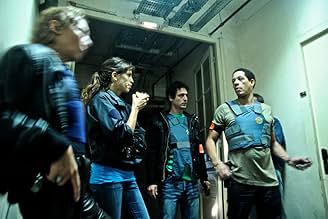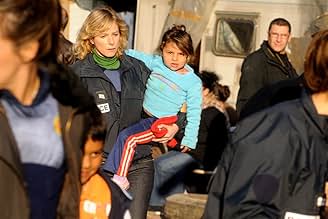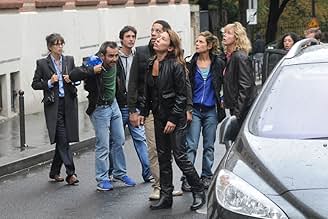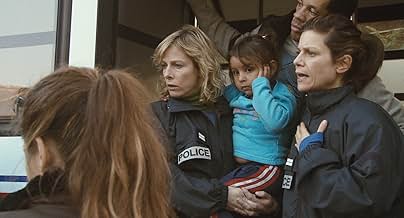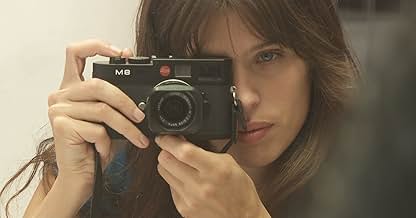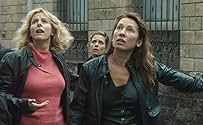CALIFICACIÓN DE IMDb
7.3/10
16 k
TU CALIFICACIÓN
Una periodista que cubre a la policía asignada a una división juvenil entra en una aventura con uno de sus sujetos.Una periodista que cubre a la policía asignada a una división juvenil entra en una aventura con uno de sus sujetos.Una periodista que cubre a la policía asignada a una división juvenil entra en una aventura con uno de sus sujetos.
- Dirección
- Guionistas
- Elenco
- Premios
- 7 premios ganados y 22 nominaciones en total
Frédéric Pierrot
- Baloo
- (as Frederic Pierrot)
- Dirección
- Guionistas
- Todo el elenco y el equipo
- Producción, taquilla y más en IMDbPro
Opiniones destacadas
Polisse is a difficult film to define. Based on real-life cases dealt with by the Child Protection Unit covering the 19th arrondissement (borough or quarter) of Paris, it could possibly be called a docudrama, although it does not cover events of historical significance.
Maïwenn, who wrote, directed and featured in the film as a photojournalist shadowing the unit, spent time herself with such a unit for research. All the cases featured in the film are supposed to have taken place while she was there or were recounted to her at that time. It is this that gives the film its lifelike, gritty quality. Indeed, the first scene plunges straight into an interview with a little girl who claims her father is molesting her, and is swiftly followed by other similar interviews with suspected paedophiles, victims and accusers. Despite the obviously very serious subject of the film, humorous moments pepper the script, which successfully highlights the tragicomic ludicrousness of some of the situations they encounter.
Alongside the cases of child molesting and underage rape that the team deals with on a day- to-day basis, the film delves into the complex personalities of the characters, who are at times tender and patient, and at others frustrated, angry and even violent. We are privy to the emotional strain the job has on these police officers and the effects on their personal lives, their marriages and relationships with their children. Special bonds also develop between them, and their intimacy and affinity is so well portrayed that it is easy to forget that this is in fact a film and not simply a documentary.
Though Polisse, like real life, does not really follow a plot line, and we never find out if the criminals are actually brought to justice, one does not become bored or frustrated or ever wonder where the film is going. In fact, just like the TV series The Wire to which it has been compared, it is the lack of obvious direction of the film that ultimately makes it all the more powerful and effective.
Maïwenn, who wrote, directed and featured in the film as a photojournalist shadowing the unit, spent time herself with such a unit for research. All the cases featured in the film are supposed to have taken place while she was there or were recounted to her at that time. It is this that gives the film its lifelike, gritty quality. Indeed, the first scene plunges straight into an interview with a little girl who claims her father is molesting her, and is swiftly followed by other similar interviews with suspected paedophiles, victims and accusers. Despite the obviously very serious subject of the film, humorous moments pepper the script, which successfully highlights the tragicomic ludicrousness of some of the situations they encounter.
Alongside the cases of child molesting and underage rape that the team deals with on a day- to-day basis, the film delves into the complex personalities of the characters, who are at times tender and patient, and at others frustrated, angry and even violent. We are privy to the emotional strain the job has on these police officers and the effects on their personal lives, their marriages and relationships with their children. Special bonds also develop between them, and their intimacy and affinity is so well portrayed that it is easy to forget that this is in fact a film and not simply a documentary.
Though Polisse, like real life, does not really follow a plot line, and we never find out if the criminals are actually brought to justice, one does not become bored or frustrated or ever wonder where the film is going. In fact, just like the TV series The Wire to which it has been compared, it is the lack of obvious direction of the film that ultimately makes it all the more powerful and effective.
An authentic gem. A real one. Not a thriller nor a crime movie. Actually, this amazing feature reminds me Xavier Beauvois' LE PETIT LIEUTENANT, released in 2005. The real picture, poignant, terrific life of the daily procedural life of cops. Here, it is the child protection squad; a bunch of men and women who fight against child molesters, people who sometimes rape their own children !!! Policemen and women who have to face the ugliness, the most disgusting side of the real life. In this film, you cry, laugh, feel your heart under pressure when watching this wonderful performance given by the actors, so close to reality. Yes, the characters, and not only the cops, look real ones. A powerful, vivid movie that may give you the feeling to be hit by an express train.
The ending is really awful, but I won't tell you more. Go and see this masterpiece. Now!!!
The ending is really awful, but I won't tell you more. Go and see this masterpiece. Now!!!
In Paris, the photographer Melissa (Maïwenn) is assigned by the Ministry of the Interior to document the daily activities of the BPM – the Police Division for Child Protection under the command of Chief Baloo (Frederic Pierrot).
Along the days, Melissa witnesses and takes photos of pedophiles, children and women abusers and abused and befriends the team of detectives, sharing their investigations along the working days and leaning how their jobs affect their private lives. Soon she has a love affair with the sensitive and emotive Detective Fred (Joeystarr).
"Polisse" is an entertaining French docudrama about a team of police officers responsible to protect children from abuses. The screenplay uses ellipsis and it seems that is based on true stories. It is good to see how the team works and their relationship outside the work, showing that the officers are human beings with families and problems affected by their work.
The weakest part is the character Melissa, with her touristic and unprofessional camera, and taking her glasses off and loosening her hair in a silly behavior. My vote is seven.
Title (Brazil): "Polissia" ("Polisse")
Along the days, Melissa witnesses and takes photos of pedophiles, children and women abusers and abused and befriends the team of detectives, sharing their investigations along the working days and leaning how their jobs affect their private lives. Soon she has a love affair with the sensitive and emotive Detective Fred (Joeystarr).
"Polisse" is an entertaining French docudrama about a team of police officers responsible to protect children from abuses. The screenplay uses ellipsis and it seems that is based on true stories. It is good to see how the team works and their relationship outside the work, showing that the officers are human beings with families and problems affected by their work.
The weakest part is the character Melissa, with her touristic and unprofessional camera, and taking her glasses off and loosening her hair in a silly behavior. My vote is seven.
Title (Brazil): "Polissia" ("Polisse")
7OJT
Polisse is a documentary style feature film, which follows French police working with child molestation and abuse. We're follow them in a film without a plot, only everyday life and troubles, and through dinners and bar escapades. The cases and the language is really rough stuff, and this is obviously not for everyone. If you're easily offended, keep away.
We're given no explanation, just follow what happens as a fly on the wall. So is the director here, Maiwenn, which uses a small tourist camera, taking pictures all the time. Strange, and looking quite unprofessional, but then she is originally an actor. We're looking at actors, but this is all based upon real life, we're told, at least.
We see some horrific cases of them unveiling child abuse of different kinds, and when they talk in their spare time, the language is very graphic. Maybe this is a work hazard, still I find it strange that these grown ups talk low life language, using all kinds of sexual words when they seem to have a normal conversation. It might be right, but maybe this feels too much for an ordinary viewer. At least I thought so, and I'm not easily offended.
Two more things irritate. First of all Maiwenn, photographing everywhere with her old camera. She looks lame doing this, and ruins the impression of this as a serious movie. Sue's like a misfit, or bimbo in this film. She's acting, and I don't understand her mission in this. But being writer and director, she obviously needed a role as actor as well. With better professional help, the film would have been way better. Still there's lots of stuff which will hit you hard here.
The police acting like this in their spare time makes us also questioning their motives as well as their credibility and them being real professionals, though we really down to earth understand they are well qualified personnel. But from time to other you really wonder...
Interesting, and nice try, but still the film has some troubles impossible to disregard.
The second main problem is we never follow out the interesting things which we see. It's all small fragments. We don't get to know people. Instead we get longer pieces of non-important dancing at night clubs and ridiculous discussions. Still this is interesting, and worth to watch. Just expect to be annoyed, insulted, chocked, bored and disgusted every other minute.
We're given no explanation, just follow what happens as a fly on the wall. So is the director here, Maiwenn, which uses a small tourist camera, taking pictures all the time. Strange, and looking quite unprofessional, but then she is originally an actor. We're looking at actors, but this is all based upon real life, we're told, at least.
We see some horrific cases of them unveiling child abuse of different kinds, and when they talk in their spare time, the language is very graphic. Maybe this is a work hazard, still I find it strange that these grown ups talk low life language, using all kinds of sexual words when they seem to have a normal conversation. It might be right, but maybe this feels too much for an ordinary viewer. At least I thought so, and I'm not easily offended.
Two more things irritate. First of all Maiwenn, photographing everywhere with her old camera. She looks lame doing this, and ruins the impression of this as a serious movie. Sue's like a misfit, or bimbo in this film. She's acting, and I don't understand her mission in this. But being writer and director, she obviously needed a role as actor as well. With better professional help, the film would have been way better. Still there's lots of stuff which will hit you hard here.
The police acting like this in their spare time makes us also questioning their motives as well as their credibility and them being real professionals, though we really down to earth understand they are well qualified personnel. But from time to other you really wonder...
Interesting, and nice try, but still the film has some troubles impossible to disregard.
The second main problem is we never follow out the interesting things which we see. It's all small fragments. We don't get to know people. Instead we get longer pieces of non-important dancing at night clubs and ridiculous discussions. Still this is interesting, and worth to watch. Just expect to be annoyed, insulted, chocked, bored and disgusted every other minute.
Couldn't say it any better then the Two comments before me; but had to write this anyway.
The Subject matter in film would make a lot of people I know feel very uneasy; I'm not used to seeing this kind of dialog in most movies I watch. Definitely a Creepy Subject.
The 'fast pace' of the film reminded me a bit of: "HILL STREET BLUES", one of the first 'Cop Shows' on TV, with this kind of Fast Pace.
Not understanding French, feel that I wasn't getting ALL that was being said, but got enough.
Some People will NOT watch films with Sub Titles; their loss. If you're One of Them- maybe you should start.
Lastly: One scene had me laughing out loud; was the Only Real 'funny' scene, in this Serious film about a serious subject; but isn't Life Just like that???
The Subject matter in film would make a lot of people I know feel very uneasy; I'm not used to seeing this kind of dialog in most movies I watch. Definitely a Creepy Subject.
The 'fast pace' of the film reminded me a bit of: "HILL STREET BLUES", one of the first 'Cop Shows' on TV, with this kind of Fast Pace.
Not understanding French, feel that I wasn't getting ALL that was being said, but got enough.
Some People will NOT watch films with Sub Titles; their loss. If you're One of Them- maybe you should start.
Lastly: One scene had me laughing out loud; was the Only Real 'funny' scene, in this Serious film about a serious subject; but isn't Life Just like that???
¿Sabías que…?
- TriviaDirector Maïwenn's first idea for the title was "Police", but another film already had this name: none other than famous French director Maurice Pialat's film in 1985. Her next idea was, "Vous êtes de la police?", but it too was already a film title. One day, as her young child was learning to write, he misspelled "Police", and she saw in front of her eyes the perfect title considering the subject of her movie, with a child's writing: "Polisse".
- ConexionesFeatured in Ebert Presents: At the Movies: Episode #1.18 (2011)
- Bandas sonorasL'Île aux Enfants
Music by Roger Pouly
Lyrics by Christophe Izard
Performed by Anne Germain
(p) & (c) 1974 Editions de Alouettes (catalogue Technisonor)
Avec l'aimable autorisation de Sony ATV
Selecciones populares
Inicia sesión para calificar y agrega a la lista de videos para obtener recomendaciones personalizadas
- How long is Polisse?Con tecnología de Alexa
Detalles
- Fecha de lanzamiento
- País de origen
- Sitios oficiales
- Idiomas
- También se conoce como
- Cánh Sát Pháp
- Locaciones de filmación
- Boulevard du Palais, Paris 1, París, Francia(scene at the café)
- Productoras
- Ver más créditos de la compañía en IMDbPro
Taquilla
- Total en EE. UU. y Canadá
- USD 211,440
- Fin de semana de estreno en EE. UU. y Canadá
- USD 16,568
- 20 may 2012
- Total a nivel mundial
- USD 20,601,245
- Tiempo de ejecución
- 2h 7min(127 min)
- Color
- Mezcla de sonido
- Relación de aspecto
- 1.85 : 1
Contribuir a esta página
Sugiere una edición o agrega el contenido que falta



